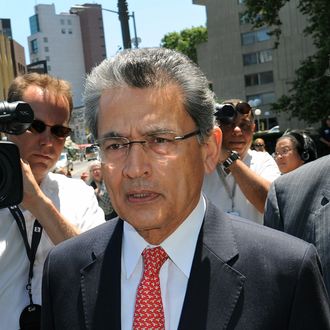
Have you ever entered into a long-term financial arrangement that sounded, at the time, like a generous and sensible idea but quickly turned into a horrible, heartbreaking burden? Like: buying a pair of Yankees season tickets for your baseball-loving girlfriend, then having her dump you before the All-Star break, and having to keep going to the games (after all, you paid for them!) with an empty seat next to you all season, reminding you of the way she used to sing “Take Me Out to the Ballgame” during the seventh-inning stretch?
That sort of happened to Goldman Sachs this year. Only instead of a disloyal girlfriend, the bank had Rajat Gupta.
According to DealBook’s Peter Lattman, Goldman has been on the hook for nearly $30 million of Gupta’s legal fees, which he racked up in his monthlong insider trading trial that ended in a conviction last week. As a former Goldman board member, Gupta is still protected by the bank’s bylaws for Goldman-related legal matters, which his insider trading trial technically was.
This is darkly funny, because Goldman hates Gupta!
To say that Goldman Sachs has paid Mr. Gupta’s legal bills grudgingly would be an understatement. Not only did Mr. Gupta abuse his role as a Goldman director, the jury determined, but Mr. Gupta’s lawyers assailed the bank throughout the trial. They depicted Goldman as a cesspool of tipsters feeding Mr. Rajaratnam inside information. A defense lawyer called Lloyd C. Blankfein, Goldman’s chief executive, who was forced to testify for three days, “cold and callous.”
Anyway, it’s not a total loss for Goldman. Gupta will have to repay the bank if his conviction stands. And under corporate governance laws, Goldman can argue to be repaid some or all of the fees, under the fairly sensible assumption that corporations should only have to indemnify their employees to a certain extent — say, until they are convicted of insider trading.
But for the moment, we hope Goldman is writing little passive-aggressive notes in the memo section of its checks to Gupta. “Don’t spend it all at the prison commissary!”, etc. etc. It would ease the pain.





























